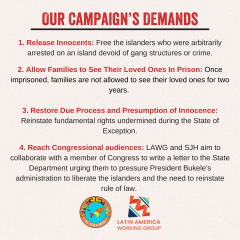Alejandro Encinas, the Mexican government’s top human rights official and head of the truth commission investigating the 2014 disappearance of 43 students, resigned Thursday, stepping away from one of the country’s worst human rights atrocities in recent history as it remained unsolved.
Mr. Encinas, the under secretary for human rights, had served in the role since December 2018, and said he was leaving government to work on the campaign of Claudia Sheinbaum, the governing party’s candidate in next year’s presidential elections.
In a message posted on X on Thursday, Mr. Encinas thanked President Andrés Manuel López Obrador and his colleagues, and said, “My respect and gratitude to all the victims, families, social movements and organizations for the trust placed in my management.”
A longtime friend and political ally of Mexico’s president, Mr. Encinas has long been at odds with the Mexican armed forces, and has been one of the few people willing to criticize the military from inside the administration.
Last summer, his truth commission published an explosive report about the 43 students’ disappearance in Ayotzinapa in southern Mexico, accusing the military of playing a role and calling the events “a crime of the state.”
Then, questions emerged about the evidence, and Mr. Encinas came under intense scrutiny — especially after he admitted in an interview with The New York Times that key pieces of the inquiry had been “invalidated.”
Mr. Encinas was also targeted with Pegasus, the world’s most notorious spyware, while investigating the military, The Times reported earlier this year. Pegasus is licensed only to government agencies, and the spying revelation undercut Mr. López Obrador’s vow to end the “illegal” and “immoral” surveillance of the past.
The Mexican president has said his government does not spy on anyone.
On Wednesday, Ms. Sheinbaum, a former mayor of Mexico City and a protégé of Mr. López Obrador, posted a photo of herself meeting with Mr. Encinas on X, the social platform formerly known as Twitter, writing, “I invited him to support us in the upcoming process and he gladly accepted.”
Mr. Encinas’s resignation was effective Thursday, Mr. López Obrador said during his daily news conference. He thanked the human rights official for his work and said that Félix Arturo Medina Padilla, the head of the country’s fiscal prosecutor’s office, would replace Mr. Encinas.
“He’s a very good public servant,” Mr. López Obrador said. “Prepared, honest, with convictions.”
Mr. López Obrador added that the investigation into the students’ disappearance continued, under the purview of Mr. Medina Padilla. Although the truth commission published some documents on Wednesday relating to the military’s involvement in Ayotzinapa, the families of the disappeared students have been asking for much more to be released.
On the night they vanished in September 2014, the 43 students had commandeered a number of buses to drive to a demonstration in Mexico City commemorating a 1968 student massacre.
But the students were intercepted by gunmen, including municipal police officers, who forced them off the buses, shot some of them and took the rest away. After that, little is known about what happened. The government of President Enrique Peña Nieto fumbled its investigation, and Mr. López Obrador’s first executive order as his successor was to create a truth commission and appoint Mr. Encinas.
To date, no one has been convicted of the crime, turning the case into a symbol of a system that cannot solve even the most brazen acts of brutality.
The Center for Human Rights Miguel Agustín Pro Juárez — whose director, Santiago Aguirre, is the primary lawyer representing the families — said in a statement on Thursday that it regretted Mr. Encinas’s departure and that “even in disagreement, he built bridges to the plurality of the country and respected the dignity of the people.”
But the statement also pointed out that there is far more work to be done on the case: “In the face of disinformation generated by the president with his narrative versus experts, former officials and civil society, we reiterate that it is not resolved and we again point out that the military still hides relevant information for clarification.”


